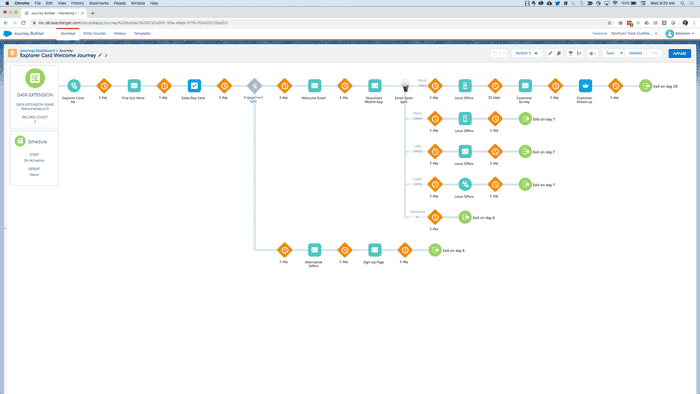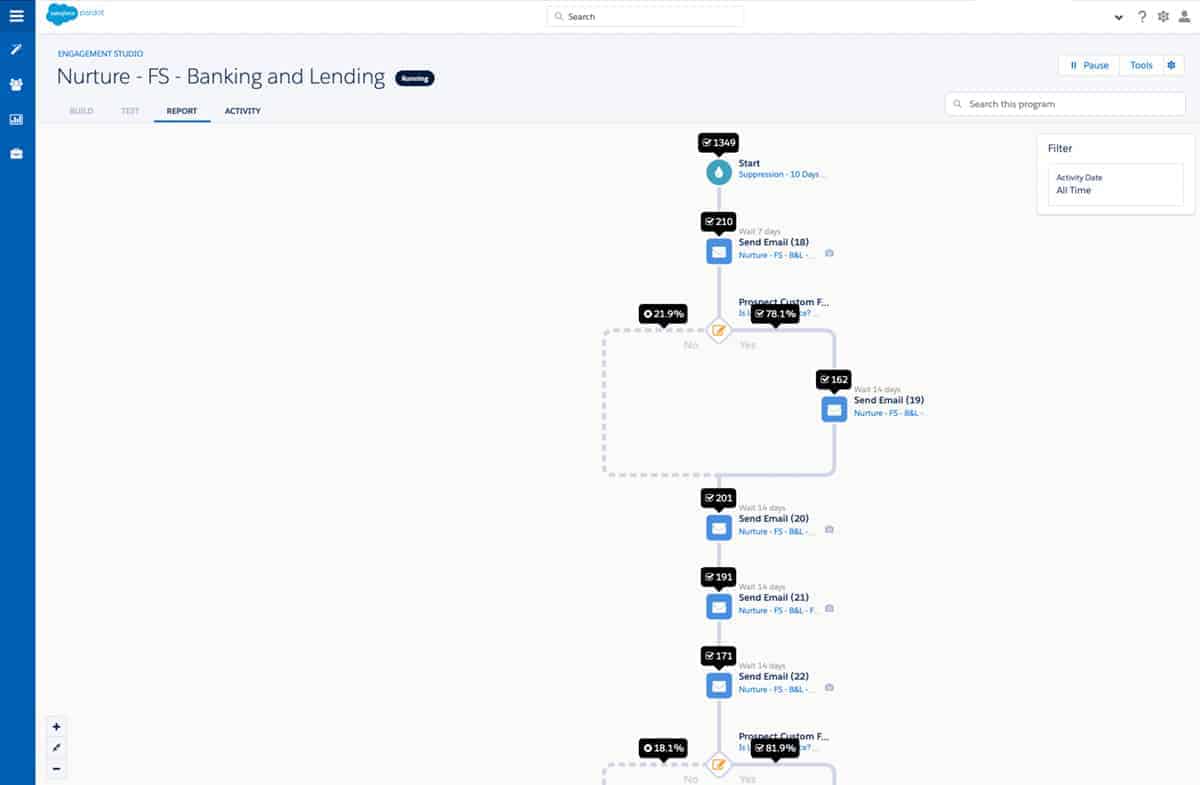“What’s the difference between Marketing Cloud and Pardot?”
I hear this all the time from our clients here at Silverline. Truth is, a lot has changed since Salesforce acquired Pardot in 2013 (and since its original launch in 2007!) New features, use cases, and marketing techniques mean both Marketing Cloud and Pardot look very different.
The answer, these days, is that you technically purchase Pardot as part of Salesforce Marketing Cloud. So the question is less about the difference between the two, and more about whether you need all of the features and flexibility that Marketing Cloud offers, or if you can accomplish your marketing goals with just Pardot (which is a great tool on its own!).
Pardot vs. Marketing Cloud
Selecting a marketing tool has three factors: your marketing team, your marketing strategy, and then technology. Before you select a technology, make sure you can answer these questions:
- What does the internal marketing team look like? What roles, skills, and experience do they have?
- Are you working with an external marketing team? What roles, skills, and experience do they have?
- What does your marketing strategy include? Email, SMS, Website, Social, Scoring, etc.
- What are you doing today and what do you want to be able to do in the future?
- Do you have a defined process to manage your strategy and how will you measure success?
If you’re trying to choose between the two, there are a few key things to think about:
1. Marketing Cloud is an all-in-one marketing solution
Marketing Cloud’s marketing automation tools have gone through a wave of transformation in recent years. Though the core functionality and CRM still exists, a series of mergers and acquisitions have delivered an impressive array of new features. With Marketing Cloud, everything you need is in one place to build end-to-end multichannel marketing campaigns, from email to digital advertising to social media to SMS/mobile messaging.
Some key features include:
- Interaction Studio: Built-in analytics that recognize customers and use AI-powered insights to make account-based marketing easier than ever
- Email Marketing: Drag-and-drop segmentation and deliver emails at any stage of the customer lifecycle
- Social Media Marketing: Social listening and customer sentiment analysis across Facebook, Twitter, LinkedIn, and more with the Social Studio
- Digital Advertising: Display advertising across social media channels with the Advertising Studio
- Mobile Messaging: Targeted SMS messaging
If your team wants one platform to do it all, Marketing Cloud is the tool for you.
2. Pardot is a targeted, email-centric solution
Teams can purchase Pardot as a stand-alone solution for CRM or use it embedded within Marketing Cloud. Pardot, unlike Marketing Cloud, is more focused on email. While it does have some features around SEO/SEM and other channels, the core use case is all about email marketing and lead generation and nurturing.
Some key features include:
- Email Marketing: Create and send email campaigns
- Lead Generation: Easily build landing pages and forms to convert visitors into known leads
- Lead Nurturing: Build data-driven nurture email flows and other customer-centric marketing campaigns
- Lead Scoring: Determine account-based marketing and sales campaigns and identify key opportunities to send emails and follow up at the right time to the right person
- Sales/Marketing Alignment: Activity tracking, CRM engagement, and real-time alerts for your sales team when key prospects are on your website or interact with emails
If your team wants to dive deep into email marketing, Pardot is the tool for you.
3. B2C vs. B2B
You might have read that Marketing Cloud is for B2C businesses and Pardot is for B2B organizations. On some level, that separation makes sense — though in my experience, it matters more about your maturity level as a marketing team and the level of personalization you’re working toward.
Marketing Cloud is a multi-faceted, flexible tool designed with 1:1 marketing, real-time journeys, robust data integrations and analytics, and integrated with other channels, which makes it ideal to get as close to the customer as possible. Their B2C Journey Builder, one of the core features, is what makes these interconnected, personalized marketing campaigns possible.
That said, some of the more traditional B2B activities like sales enablement, lead nurturing and scoring, and CRM automation are done really, really well in Pardot.

Whether you’re using ebooks and content marketing to drive leads through gated forms or have graduated to chat-based sales and marketing techniques on your website, Pardot will be able to handle those journeys and flows for a customer-centric B2B marketing program.
Which to pick?
To summarize, if you’re a larger, B2C company and need the full slate of marketing technology and automation available to you, Marketing Cloud is a great choice. But if you’re a smaller team or already have tools in place for social media, advertising, and other marketing channels, Pardot might be a better choice to focus on email and demand generation.
And if you’re not sure? Reach out to our team. Silverline’s deep expertise in financial services and healthcare give you peace of mind when it comes to your technology stack. Silverline has a team of Marketing Cloud and Pardot experts, and over a decade of working with Salesforce CRM. We’d love to help you on your journey and find the solution that best fits your need.




